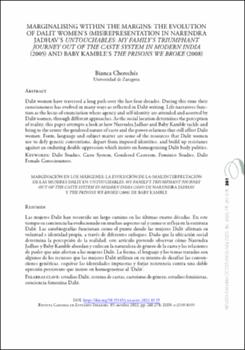Marginalising Within The Margins: The Evolution of Dalit Women’s (Mis) Representation in Narendra Jadhav’s Untouchables: My Family’s Triumphant Journey Out Of The Caste System In Modern India (2005) And Baby Kamble’s The Prisons We Broke (2008)
Author
Cherechés, BiancaDate
2022Abstract
Las mujeres Dalit han recorrido un largo camino en las últimas cuatro décadas. En este
tiempo su conciencia ha evolucionado en muchos aspectos tal y como se refleja en la escritura
Dalit. Las autobiografías funcionan como el punto donde las mujeres Dalit afirman su
voluntad e identidad propia, a través de diferentes enfoques. Dado que la ubicación social
determina la percepción de la realidad, este artículo pretende observar cómo Narendra
Jadhav y Baby Kamble abordan y enfocan la naturaleza de género de la casta y las relaciones
de poder que aún afectan a las mujeres Dalit. La forma, el lenguaje y los temas tratados son
algunos de los recursos que las mujeres Dalit utilizan en su intento de desafiar las convenciones
genéricas, esquivar las identidades impuestas y forjar resistencia contra una doble
opresión persistente que insiste en homogeneizar al ‘Dalit’. Dalit women have traversed a long path over the last four decades. During this time their
consciousness has evolved in many ways as reflected in Dalit writing. Life narratives function
as the locus of enunciation where agency and self-identity are attended and asserted by
Dalit women, through different approaches. As the social location determines the perception
of reality, this paper attempts a look at how Narendra Jadhav and Baby Kamble tackle and
bring to the centre the gendered nature of caste and the power-relations that still affect Dalit
women. Form, language and subject matter are some of the resources that Dalit women
use to defy generic conventions, depart from imposed identities, and build up resistance
against an enduring double oppression which insists on homogenising Dalit body politics.





